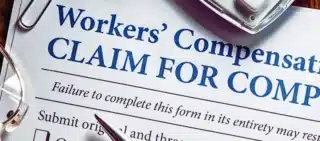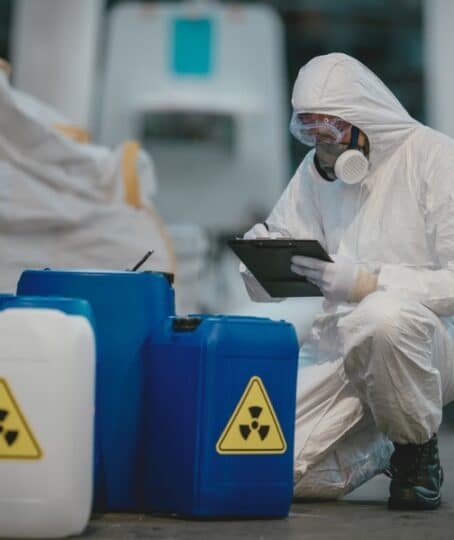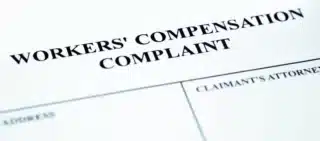
At Strong Law Offices, we have a team of workers' compensation lawyers who understand the financial setbacks and physical limitations...


You might be able to sue a chemical plant for toxic exposure or file a workers’ compensation claim if you suffered chemical-related injuries. Toxic exposure occurs when foreign chemicals enter your body and cause harm. For example, if you inhale chemicals that irritate your respiratory system or ingest them through food or water, they could damage the cells in your body.
Damage resulting from hazardous substances can lead to cancer or other serious illnesses, like liver disease or kidney failure. Depending on the circumstances of your exposure, you may recover damages through a civil lawsuit or your employer’s workers’ compensation policy for your resulting losses.

Products you use or come into contact with daily can contain dangerous chemicals or substances. Chemicals become toxic when contact with them causes adverse health effects. The type of effects a substance causes, as well as its potency, determine its toxicity.
In the home, workplace, and other places you regularly visit, you may come into contact with a variety of toxic substances – from lead in drinking water to radon or asbestos in a building. Directly touching toxic chemicals is not always needed for exposure. This may also occur through ingestion or inhalation.
In the workplace, the home, or various other places, people are regularly exposed to hazardous substances. Such exposures can cause ranging injuries or illnesses, many of which require extensive medical treatment and have ongoing effects.
According to OSHA, simple exposure involves direct contact with toxic chemicals and is responsible for 94% of occupational toxic chemical injuries. The other 6% are from incidental exposure, such as explosions and equipment contact.
Some of the most common injuries from exposure to toxic chemicals include:
The study showed that 30% of all the injuries resulting from toxic exposure were eye-related. Generally, there are three types of eye injuries related to chemicals – alkali, acid, and irritants.
Alkali burns are the most severe and can damage the eye's internal and external areas. Acid burns are severe and affect the eye's outer portions. The third type of injury is irritants, which usually cause discomfort.
Ingested or inhaled chemicals are harmful to most of the functions within the body system. The body's respiratory, nervous, cardiovascular, renal, and immune systems may be affected, depending on the toxic substances and how it was exposed to the body.
For instance, workers in shipyards or other industries may come into contact with asbestos. The inhalation of this mineral can cause lung disease and fatal mesothelioma.
Some other body parts at high risk for chemical injuries are the hands, torso, and arms.
Chemical exposure can have short- and long-term effects, and severe or minor impact. In some cases, your body may metabolize these toxic substances, causing little or no harm. The severity of chemical exposure is determined by the substance you’re exposed to, the chemical's toxicity, and the frequency and amount of exposure.
Chemicals can harm any part of the body, resulting in injuries with severe and long-term consequences for the victims. These can result in permanent disability, cancer, or organ dysfunction, which can take years to manifest.
You are eligible for workers' compensation benefits if you are exposed to toxic chemicals and have suffered injuries on the job. However, you will have to prove that the injury or illness is a result of chemical exposure and the exposure happened at work.
To help protect your rights and interests should you need to file a toxic exposure lawsuit or pursue a workers’ comp claim, you should take the following steps after exposure:
It is essential to get proper medical care because toxic exposure can lead to health problems and, eventually, death. This is the most crucial step because it helps identify the problem's root cause. As soon as you experience any work-related injury or illness, you should see a doctor. The doctor might be able to provide a diagnisis, or he or she may refer the worker to a specialist to further diagnose the exposure.
Your medical records will provide helpful proof for a personal injury or workers’ compensation claim. In addition to documenting the diagnosis of your injury or illness, your treating physician may also help support the causation of your condition.
After receiving a diagnosis from your doctor, you should contact your employer and inform them about the injury or illness. You can either do it yourself or seek the services of professionals who will handle the case with your employer.
Be sure to follow your employer’s posted procedures for reporting work-related injuries and exposures. Adhering to the appropriate steps, in the necessary timeframe, may help ensure you are approved for benefits without unnecessary delays or denials.
Collecting as much evidence as possible related to the chemical exposure is important to increase your chances of recovering compensation.
Evidence you may gather to help support your chemical burn injury claim includes:
Look for an attorney experienced with a toxic exposure lawsuit to help you make a strong case for your claim. Your attorney will guide you through the legal process, help you gather evidence, and advise you on the strength of the case.
The sooner you consult an attorney, the better your chances are for a successful outcome to your personal injury or workers' comp claim for chemical exposure.
Toxic exposure lawsuits are legal actions taken by employees, individuals, or groups of people who have suffered from exposure to toxic chemicals. These lawsuits often involve multiple parties, such as manufacturers, employees, distributors, and users.
For a toxic exposure lawsuit to succeed, the plaintiff must prove he or she was exposed to the chemical substance that caused harm. The following are legal theories on which chemical exposure lawsuits may be based:
When a defendant causes harm to consumers, employees, or individuals through his or her own act or omission, he or she can be held liable for the resulting damages. In a negligence-based lawsuit, the defendant must have failed to properly execute safe handling of toxic substances, resulting in injuries to the plaintiff.
When consumers buy products from a company, they can reasonably expect them to be safe and serve their purpose. If the product has defects that cause harm to consumers, the at-fault party can be held responsible for damages through strict liability. The claim is backed up by the fact that the product caused injuries to the users despite being used as intended.
In a toxic exposure lawsuit, strict liability may apply when a company creates a product that contains a harmful substance.
The different types of chemical exposure lawsuits include:
This lawsuit arises when workers and individuals are harmed by exposure to toxic chemical substances. Chemical plants use many toxic chemicals, which cause workers to experience various injuries.
Consumers may only be exposed to trace amounts of these chemicals, unlike the workers who are exposed to these substances and have a greater risk of developing severe health complications.
Common chemicals involved in toxic tort cases include asbestos, benzene, mercury, pesticides, manganese, and more. A worker may file for a toxic occupational injury case, resulting in a workers' compensation claim through his or her employer.
Victims could also recover against third parties, such as the building owner, manufacturer, chemical distributors, or even the equipment that exposed the worker to these chemicals.
This type of contamination happens when chemical substances are released into the environment, causing harm to wildlife, human health, and the ecosystem.
Environmental contamination occurs through various means, including factory pollution, waste disposal practices, or chemical spills. Environmental contamination is severe and has far-reaching effects, often calling for mass action against the party responsible for compensating for the harm they have caused.
This type of chemical exposure lawsuit involves the legal responsibility that manufacturers, distributors, and retailers have for damages that their products may cause to the public.
Product liability cases involve health damage from exposure to toxic substances in products or even asbestos in building materials. For the plaintiff to win a product liability case, the consumer must prove that the product was dangerous to his or her health and caused harm.
Employees in various industries are exposed to chemical substances daily. Some chemicals are mild, with minimal or no immediate effects, while others are severe and must be cautiously treated. Exposure to these chemicals over time can be disastrous, resulting in serious health complaints, chronic illnesses, and other problems.
Whether you can sue your employer for chemical exposure depends on your situation and the laws in your state. The Illinois workers’ compensation law prohibits people from suing their employers for work-related injuries.
The first thing you should do is talk with a lawyer about your case, as there are many types of chemical exposure cases that require different approaches.
This law provides a mutual protection network for employees and employers in the event of an on-the-job injury. Employees are covered under the workers' compensation program for any injuries or illnesses caused by their job duties. However, there is a catch: employees cannot sue their employers for damages, injuries, or toxic chemical exposure.
Employers should protect their workers, and the workers' compensation program holds them accountable.
If exposed to hazardous chemicals at work, you must follow all the steps outlined above. Additionally, you should contact your attorney as soon as possible. The attorney will determine whether your claim is valid and advise you on how best to proceed with the case.
The workers' compensation claim does not allow you to sue your employer for injuries, but you could sue another party, the property owner, for toxic exposure. If your company rents its facility, and after some time you develop complications from chemical exposure, such as difficulty breathing, dizziness, or illness, you may hold the building owner accountable for the negative consequences you have suffered.
Each state has laws regarding whether and under which circumstances an individual can sue a chemical plant for toxic exposure. Finding justice through a lawsuit for chemical exposure can be lengthy and tedious, but it is the most efficient way to seek compensation for your sustained chemical injuries.

At Strong Law Offices, we have a team of workers' compensation lawyers who understand the financial setbacks and physical limitations...

Common Equipment Involved in Run-Over Accidents Illinois job sites, from construction zones to industrial plants, depend on machinery to stay...

Why Do Employers Refuse to File Workers' Comp Claims? While most employers understand their legal obligation to report workplace injuries...